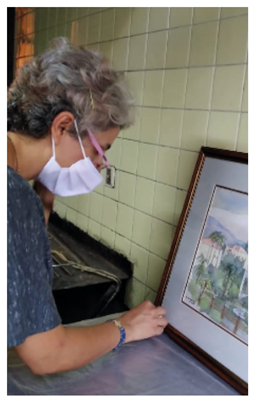When disaster strikes, who is best placed to administer first aid to world heritage? The aftermath of August’s shocking events in Beirut shows how civil society can make the difference. By David Lasserson.
The world’s premier cultural organizations waited a week to issue their statement. Their timing avoided any sense of equivalency with the human aid pouring into Beirut following the August 4 storage facility explosion in Beirut that killed, injured or rendered homeless hundreds of thousands of people. But on August 11, a joint statement was published in English, French and Arabic by a coalition of organizations including the World Monuments Fund, the Louvre, the International Council of Museums (ICOM) and the United Nations Educational, Scientific and Cultural Organization (UNESCO).
“Damaged libraries, museums, and historic buildings will require cultural first aid,” it said. “Their collections will need urgent protection and salvaging. We pledge to do all that we can to contribute to the complete recovery of the heritage that has been damaged in Beirut by this blast.”
The use of the future tense (“will require”) represented a commitment to long-term recovery. But actually, Lebanon’s cultural heritage was already receiving “cultural first aid.” In the same way that people had jumped to the aid of the wounded, a highly effective volunteer task force had convened spontaneously in defense of the nation’s cultural treasures.
Indicators of Lebanon’s rich archeological heritage can be found in the National Museum of Beirut. Over 100,000 objects range from prehistoric finds to Phoenician civilization, and from the Roman Empire to the Mamluk period. Visitors encounter artifacts from sites included in the UNESCO World Heritage List, such as Byblos, Baalbek and Tyre. Cultural heritage in Beirut extends far beyond archaeology, from the legacy of maps, documents and photographs from the Ottoman and Colonial era, to literary archives, art, and the architecture of the city, including the celebrated old districts of Gemmayzeh and Mar Mikhael.
When the blast hit, Gilbert Nicolas, an architect who has worked with museums, was driving one kilometer away in Achrafieh, an old downtown district noted for its arts scene. Escaping uninjured and seeing damaged buildings all around, he sought out a favorite place—the Sursock Museum, a recently renovated modern and contemporary art space.
“It’s a place that I love and that I visit a lot. The building combines different styles of architecture: Ottoman, Italian and Lebanese. The interior of the house is very rich, filled with wood and architectural ornaments, and they have a big collection of Lebanese artists. I was shocked by what I saw.”
Inside, he found not only extensive damage, but also a shocked and bewildered staff. “All the beautiful colored glass was shattered. There was dust and glass everywhere. The ceiling had collapsed, things were on the ground, pieces had been hit by flying glass and debris. No one knew what to do. We started taking photos and making a first assessment just to see what had happened, if there was any electrical danger, or the possibility of a flood. And we began cleaning up paintings and taking them to a storage room underground to secure them.”
After his day at Sursock Museum, Nicolas went to the University of St. Joseph, a campus adjacent to the port where the explosion occurred. Its Museum of Lebanese Prehistory was heavily damaged, and with an architect’s eye he found the walls deformed and at risk of collapsing. Nearby, the university’s celebrated Bibliothèque Orientale, an important research library, had blown-out windows, exposing content. Nicolas’ concern was for the collections and also the structure—the mudbrick ceiling, the wooden beams, the big windows.

